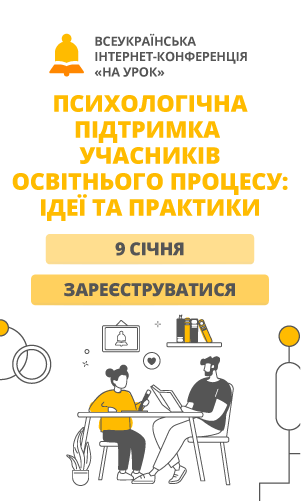Урок "Language of science. Scientific terms"
Тема уроку: Мова науки. Наукові терміни.
Мета уроку: освітня: навчати учнів використовувати іноземну мову для розуміння наукових термінів, розширити знання учнів по темі «Наука», її походження; практична: практикувати учнів у вживанні наукової лексики, активізувати знання особливостей англійської мови (науковий стиль); розвиваюча: розвивати навички читання, аудіювання, письма, говоріння, розвивати уміння аналізувати факти та наукову інформацію, удосконалювати навички вживання граматичного матеріалу; виховна: розширяти кругозір учнів, викликати змістом уроку бажання поглибити свої знання по темі «Наука».
Тип уроку: урок узагальнення і систематизації вивченого.
Методи і прийоми навчання: «мозковий штурм», читання, аудіювання, підбір значення слова до терміна, письмо, говоріння, робота в парах, робота в групах, повторення, бесіда, доповнення речень, зміна тексту з одного граматичного часу в інший, фонетична зарядка, граматична розминка, мовна здогадка.
Обладнання: дошка, підручник, ксерокопії, картки з вправами, картки з лексичними одиницями.
План уроку.
1.Організаційний момент.
2. Перевірка домашнього завдання.
3. Оголошення теми і мети уроку.
4. Мотивування навчальної діяльності учнів.
5. Актуалізація опорних знань, умінь і навичок.
6. Узагальнення та систематизація вивченого.
7. Підсумок уроку.
8. Коментар домашнього завдання, оцінок.
![]() Today we have a very interesting and a bit difficult topic – we are going to speak about sciences, their origins, about peculiarities of language in scientific style. So, when you hear the word “science” the first things on your mind are .
Today we have a very interesting and a bit difficult topic – we are going to speak about sciences, their origins, about peculiarities of language in scientific style. So, when you hear the word “science” the first things on your mind are .

![]()

 formulas achievements knowledge inventions
formulas achievements knowledge inventions
![]()
 books terms
books terms
![]()
 hard work
hard work
![]()
![]() Science Einstein
Science Einstein
![]()
![]()
![]() inventors
inventors
laws scientists
theories
Now, explain: why are all these things associated with this word?
OK, thank you for your thoughts. They are quite interesting. So, as you see there is a lot to be said on our topic.
On the blackboard you can see some key – words for understanding of the text you are going to read. Let us check if you know their meaning.
Term, technology, substance, notion, hypothesis, grammar structure, reaction, transform, concept, reasoning.
Pre – reading questions:
a)What do you think? Everyday English and Scientific English – are these word – combinations synonyms?
b) Can you explain the meaning of such terms as biology, chemistry and ecology without any dictionaries?
c) What grammar structures are used in scientific style?
Reading of the text
Language of science
Science reflects the world in specific notions and concepts, elaborating its own language. This language is highly terminological and many specific terms are Greek and Latin origin. The term BIOLOGY for example was coined from two Greek words meaning “life” and “word” or “study of, the same can be said of GEOLOGY formed from Greek words which mean “earth” and “study of. ECOLOGY originated from Greek oikos (“house”) and logos meaning “study of”.
The word “chemistry” is of 17th century English origin. The root chem probably refers to Khmi, the land in Egypt, where the technology of glass and metal was highly developed. Present – day chemistry is termed as “the study of the composition of substances, and of their effect upon one another.”
Chemistry studies substances, their structure, properties, reactions and transformations. Chemistry is a fundamental science that gives origin to many sciences.
Another peculiarity of the vocabulary is a large number of formal words and expressions in comparison with everyday standard English. The same can be said about grammar structures. The language of science is characterized by the impersonal style: Interesting results are obtained not I obtained interesting results.
For a long period of time science remained descriptive, that is why structures of the Present Indefinite are often frequent in its language. A scientist not only describes facts or processes, but also narrated them, referring to a past or future period of time; in this case he preferentially uses the Past Indefinite or Future Indefinite Tense forms. Dates and proper names are typical for such narration. Scientific languages have highly standard system of publications, among which there are monographs, articles, reviews, lectures, theses, abstracts, textbooks. Not only the structure of such publication is unified, but also the style of writing, which in fact is a combination of description, narration and reasoning. Scientific writing should be concise, not wordy, clear and informative.
4. Comprehension check.
Say if the sentences are true or false using the information of the text.
1. The term biology is Greek origin. (T)
2. The word chemistry is of 19th century English origin. (F)
3. Khmi was the land in Italy. (F)
4. There are a lot of formal words and expressions in scientific English. (T)
5. The language of science is characterized by the personal style. (F)
6. Scientists usually write fairy – tales, short stories and novels. (F)
III. Language work
1.Match the terms with their definitions:
|
1)Chemistry |
a) of what things are made, material |
|
2)Substance |
b) the science of matter and its changes |
|
3)Reaction |
c) word or word – combination denoting specific notion |
|
4)Term |
d) any identifying characteristic of a substance such as colour, taste, etc. |
|
5)Reaction |
e) process of transformation of substances |
2. Write the terms for the following definitions: (Let us divide the class into 3 teams. Do it as a term and as quickly as you can become winners.)
Science, which studies substances, their properties and reactions. Manner of writing with preferential Present Tense forms and characteristic – like sentences.
Special word used to denote a scientific notion.
The term coined from Greek words meaning “house” and “study of”.
Greek word meaning “word” or “study of”.
Science studying history of earth development, its structure and composition.
3. The next exercise is to be done in pairs. You’ll have to open the brackets and choose the correct word to make the sentence true. Your partner will say whether you are right or not and translate the sentence.
1) The word “chemistry” is of (English, Latin) origin.
2) Chemistry studies (substance, energy).
3) Chemistry gave origin to (geochemistry, ecology).
4) The language of chemistry is highly (expressive, terminological).
5) A large number of (terms, synonyms) is typical for the language of chemistry.
6) The scientific language is characterized by (personal, impersonal) style of writing.
IV. Discussing grammar
And now let us revise some grammar rules. Who can tell us which verb tenses are most often used in scientific language? (Yes, you are quite right. I’m afraid you aren’t quite right.)
Please, remind us the rules of the Present Simple Tense.
Please, remind us the rules of forming the Past Simple Tense.
Please, remind us the rules of the Future Simple Tense.
Now, let us do some exercises using these tense forms.
1.Change the sentences as needed and translate.
1) We study chemistry. She …………..
2) I learn terms. My friend ……………
3) They read a dictionary. He …………
4) He writes an exercise. We ………….
5) You like biochemistry. My father ………….
6) They will watch reactions. I ……….
7) We shall discuss results. You ………….
2. Open the brackets and choose the correct form of the verb.
1) Chemistry (study, studies) the composition of substances.
2) Many sciences (find, finds) their way in chemical laboratory.
3) They (want, wants) to know of what things are made.
4) Biochemists (study, studies) chemical composition and processes in living organisms.
5) Geochemistry (know, knows) answers to many questions of Nature.
3. Now rewrite the passage in the Future Simple Tense. Change time signals if necessary.
Students always carry out their experiments in the laboratory. They observe reactions and discuss results. Today students write essays related to chemistry. They like this kind of work and do it with pleasure. Discussions of the essays usually take place on Monday.
And now the last tense form we are revising today. It is ….right, the Past Simple Tense.
4. Change this text using Past Simple.
No one deserves the award of Teacher of the Year more than Mr. Hopkins does. He is a man that gives so much of himself to his students to offer a friendly hello in the hallway, or lend an ear if you are in need of a friend. Yet, Mr. Hopkins always commands a certain respect that no one challenges. To just sit in one of his classes is to realize he loves what he is doing and truly cares about his students. He allows them to think on their own, form their opinion and defend themselves, truly preparing them for the real world.
Tell me, please, did you find any useful and interesting word – combinations in this text?
OK, what are they? can you explain their meaning and give Ukrainian translation? Thank you very much.
V. Summarizing
So, what we speak about at the lesson today?
What new words did you learn?
Do you think this information can be useful to you in future?
You’ve worked just great today. Your marks for the lesson are…
VI. Homework
For the next lesson you should write an essay about prominent chemists or biologists.


про публікацію авторської розробки
Додати розробку
